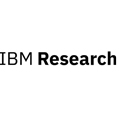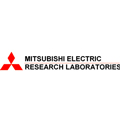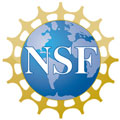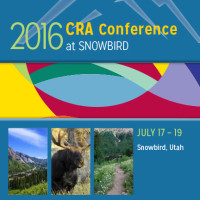
2018 CRA Conference at Snowbird
July 16-18, 2018
Snowbird, UT
The Cliff Lodge, Snowbird, Holladay Cottonwood, Salt Lake, UT 84092, United States
Event Contact
CRA Staff
info@cra.org
Event Type
Event Category
This event will be using the Whova app. While at the event, check the app for the latest agenda updates and more.
The biennial CRA Conference at Snowbird is the flagship invitation-only conference for the leadership of the North American computing research community.
Invitees: Computer science, computer engineering, and information technology department chairs; assistant, associate, and prospective chairs; directors of graduate or undergraduate education; directors of industry or government research labs/centers; and professional society or government leaders in computing.
The conference site: The Snowbird Resort is located in the Wasatch Mountains about 30 miles from Salt Lake City. A top-rated ski resort in the winter, off-season at Snowbird offers hiking amidst beautiful scenery.
Sponsors:
ACM
Facebook
Google
IBM Research
MERL
Microsoft
Whova
July 16, 2018 (Monday)
| 02:00 PM | Registration | Lobby Level, Top of the Escalator |
| 03:00 PM | New Chairs Workshop
| Superior A&B Co-chairs: Greg Hager, Johns Hopkins University, and Andrew Sears, Penn State 3:00 PM – Welcome and Overview (Greg Hager and Andrew Sears)
3:10 PM – “The Role of a Chair from a Dean’s Perspective” (Alexander Wolf)
3:30 PM – “Creating a Strategy and Setting Goals” (Anupam Joshi)
3:50 PM – “A Chair’s Journey to the Red Planet: Surviving and Thriving in Higher-Ed Administration” (Leysia Palen)
4:10 PM – Breakout groups discussing approaches to prototypical problems faced by chairs
4:50 PM – Breakout feedback/discussion
5:15 PM – Q&A
5:45 PM – Workshop Adjourn
|
| 06:00 PM | Welcome Reception | Conference Center Terrace (Tent) |
| 07:00 PM | Dinner/Awards Presentations/After Dinner Speech
| Ballroom and Lobby Welcome from the Conference Chairs Awards Presentations CRA-E Faculty Mentoring Awards The Past is Prologue: A New Golden Age for Computer Architecture In the 1980s, innovations like RISC, superscalar, multilevel caches, speculation, and compiler advances ushered in a Golden Age of computer architecture, when performance increased annually by 60%. The ending of Dennard Scaling and Moore’s Law has stalled this advance; single core performance improved only 3% last year! In addition to poor performance, modern microprocessors have poor security, as Meltdown and Spectre recently demonstrated. Looking forward, four areas hold promise:
Spurred by the deceleration of performance gains due to the ending of Dennard scaling and Moore’s law and the embarrassing state of security, the opportunities in domain-specific languages and the freeing of architects from the chains of proprietary ISAs will accelerate progress in architecture. Aided by an open-source ecosystem, agilely developed prototypes will demonstrate large advances and thereby hasten commercial adoption. We envision the same rapid improvement as in the last Golden Age in the 1980s, but this time in cost, energy, and security as well in performance. |
July 17, 2018 (Tuesday)
| 06:00 AM | Registration | Lobby Level, Top of the Escalator |
| 07:00 AM | Breakfast | Conference Center Terrace (Tent) |
| 08:30 AM | Plenary Panel: Diversity in Leadership
| Ballroom and Lobby Chair: Carla Brodley, Northeastern University Much of the effort of the Conference at Snowbird community has focused on increasing the diversity of our students across all stages of the academic pipeline with some efforts post Ph.D. The focus of this panel of industry and academic experts is on the challenges and opportunities in retaining diverse employees. And further, on efforts to ensure leadership paths in industry and academia of diverse members of staff/faculty. In short, our focus will be on efforts to ensure that diversity does not stop at “bringing diversity in the door” – put another way, people go where they are invited and stay where they are welcomed. |
| 10:00 AM | Break | Ballroom Lobby |
| 10:30 AM | Parallel Tracks
Increasing Diversity in Computing is Easier Than You Think: Some Small Steps that Make a Big Difference (Ballroom 1) This panel will consider a number of common questions that colleges and universities face in trying to increase diversity of the population of computing students. The discussion will focus on the types of programs and activities that may be in reach for most academic units, and particularly for units that feel they are currently not doing enough to increase diversity and retain a diverse student population. The following questions are representative of the intended discussion. • What programs are widely used and proven successful for recruitment, development and retention of diverse student populations in undergraduate computer science programs? • Depending on type of institution, what are low-cost, low-effort programs that a unit can undertake? • In universities where the entire student population is not very diverse, how can a unit create a community for students from underrepresented groups? • Students from different underrepresented groups have unique needs. What are things a unit should think about in creating a welcoming environment for all students? • What are examples of ways that a unit can partner with other institutions to create a diverse student pipeline? Growing a CS Department into a School/College of Computing (Ballroom 2) As computing continues to grow by tremendous leaps and bounds and to permeate universities’ intellectual landscape, many department chairs are finding their programs have outgrown, or are outgrowing, the confines of their current locations in colleges of engineering or science. Discussions are taking place in many departments about exploring the possibility of expanding to a school or college of computing (or a similar name). In this panel, we have gathered a set of leaders from Universities who have successfully made the transition from a Department of Computer Science to a College of Computing. The panelists will discuss the benefits of becoming a College of Computing, as well as, the challenges Departments face in making a successful transition to a College. Department Rankings (Ballroom 3) Department rankings matter, whether we like it or not. Our community suffers when these rankings are performed poorly by external parties who may have limited understanding of our field. This is the case, even though we all understand that ranking reduces complex multi-attribute entities to a single number. This panel will describe some ways forward that are recently being explored. |
| 12:00 PM | Lunch | Conference Center Terrace (Tent) |
| 01:30 PM | Parallel Tracks
Improving Faculty Recruiting in the Computing Community (Ballroom 1) Faculty recruiting challenges are on the minds of many computing research members. In this session, the panelists will discuss faculty recruiting challenges faced by departmental leadership (e.g., low yield), faculty members (e.g., multiple candidates per week), and faculty candidates (e.g., many strong candidates not getting academic interviews). It will also assess the needs, if any, for computing research community action. Using CRA Data to Improve Your Department and Inform Decision Making (Ballroom 2) This session will discuss two of CRA’s data sources: the Taulbee Survey and the Data Buddies Project. Attendees will learn how these data sources are distinct yet complementary and gain a better understanding of the information available from each in published reports and departmental comparison reports. Speakers will describe how departments have made use of these data, and discuss issues of individual and departmental privacy and the tradeoffs of survey length, comprehensiveness, and response rate. A portion of the session will be devoted to getting feedback on how Taulbee and Data Buddies can be of better use to the community. Augmenting, Not Replacing, People (Ballroom 3) Artificial intelligence (AI) technologies are rapidly maturing into tools that are impacting our everyday lives. However, contrary to popular conception, most of these tools will not be autonomous, stand-alone systems, but rather will manifest as human assistants and augmentations. While autonomous driving is featured in the headlines, the short-term impact of advances in this field will be increased safety, comfort, and convenience, with the driver still at the wheel. New technologies in healthcare will not replace doctors, but will leverage their skill and judgement by providing super-human augmentations for eyes, hands, and intellect. As more robots move onto the manufacturing floor, they are most likely to function as ever-smarter programmable tools, and will still require human coworkers to teach them new tasks and to do those elements that are simply too hard to automate. Meanwhile, the scope of AI personal assistants continues to broaden in terms of their impact on different aspects of human interactions. This session explores these themes, emphasizing in particular the areas where AI and people will work together to do what neither can do alone. |
| 03:00 PM | Break | Ballroom Lobby |
| 03:30 PM | Networking Activities
Guided Hikes Reading Groups “Algorithms of Oppression: How Search Engines Reinforce Racism”, by Safiya Umoja Noble “Sexual Harassment of Women: Climate, Culture, and Consequences in Academic Sciences, Engineering, and Medicine”, Consensus Study Report published by the National Academies of Sciences, Engineering, and Medicine (2018).
|
| 06:30 PM | Dinner
| Ballroom and Lobby After Dinner Talks Computing Research Futures Muddied Waters: Online Disinformation During Crisis Events Machine Learning for Science While machine learning is revolutionizing many areas of computer science, it is also impacting the theory and practice of physical, energy and life sciences. But the challenges and opportunities in these domains are somewhat different. First, science requires the need to interpret and generalize models and to explain behavior in a manner consistent with physical laws. Second, the scaling problems go beyond large data sets and include very large models and machines, leveraging the access to systems and expertise in high performance computing. Third, the data may be highly complex, and may have a low signal to noise ratio, come from highly optimized sensors, or involve multi-modal data from different experiments or simulations. We expect progress in “ML for Science” will benefit these other disciplines, but will also provide feedback to aid in the power and understanding of machine learning more broadly. |
July 18, 2018 (Wednesday)
| 06:00 AM | Registration | Lobby Level, Top of the Escalator |
| 07:00 AM | Breakfast | Conference Center Terrace (Tent) |
| 08:30 AM | A Future with Affordable Self-driving Vehicles
| Ballroom and Lobby Chair: Vivek Sarkar, Georgia Tech We are on the verge of a new era in which robotics and artificial intelligence will play an important role in our daily lives. Self-driving vehicles have the potential to redefine transportation as we understand it today. Our roads will become safer and less congested, while parking spots will be repurposed as leisure zones and parks. However, many technological challenges remain as we pursue this future. In this talk I will showcase the latest advancements made by Uber Advanced Technologies Group’s Research Lab in the quest towards self-driving vehicles. In addition, you’ll hear my thoughts on the future of education, where both industry and academia come together to form the next generation of students. |
| 10:00 AM | Break | Ballroom Lobby |
| 10:30 AM | Parallel Tracks
Self-driving Cars: When Will They Become Mainstream (Superior A&B) Major changes in transportation technologies have always been accompanied by societal and economic shifts, both anticipated and unintended. Self-driving cars represent one of the biggest upcoming societal disruptions in the use of AI and computing technologies. These new capabilities will likely reshape jobs, enable independence, displace car ownership for some, and reshape transportation patterns for not only automobiles but also in air and train travel. However significant challenges have yet to be met to create a pervasive, affordable and accessible autonomous automobile system. This panel will examine the current state of the art in autonomous vehicle technologies, discuss where the early adoption of these technologies are likely to occur, when they will become mainstream, and where the key technical and societal challenges lie, including considerations such as safety, security, and privacy. The panelists have a deep background in enabling technologies for self-driving cars, from both the academic and industry perspectives. Questions from the audience will be welcomed on all aspects of this topic. Booming Faculty: Opportunities and Challenges (Primrose B) To cope with the rapid growth of student enrollments, many departments have been scrambling to rapidly grow their faculty. This panel will look at a number of questions raised by this rapid growth, among them:
How to Stop Driving Women Out of Computing — What happens in your backyard matters! (Twin Peaks A&B) Harassment and bias have been driving women out of computing for decades. Changing the culture requires admitting there is a problem and taking personal responsibility. A typical response is that this is not a problem in my backyard. This panel will provide data and discussion to provoke some soul searching among the audience that these are problems that occur within your own backyard. The panel is not about the familiar “pipeline” problem, but about “the meat grinder” in the pipeline. The panel will be organized into three sections, each with a discussion period: (1) driving women out; (2) harassment; and (3) bias in research evaluation. We hope the panel motivates computing research communities to undertake a data-driven approach to understanding and solving the problems we identify. |
| 12:00 PM | Lunch | Conference Center Terrace (Tent) |
| 01:30 PM | Parallel Tracks
Recruiting, Retaining, and Advancing Teaching Faculty (Superior A&B) This panel will address questions being considered by the CRA ad hoc committee on the role of teaching faculty in computing units at research universities, and in particular how administrative leaders (in particular chairs) can improve the effectiveness and satisfaction of teaching faculty. Topics are likely to include: • What are best practices for the role of teaching faculty? • What can CRA data tell us about the role of teaching faculty across institutions currently? • What are the common challenges for recruiting/retaining/advancing teaching faculty and how can they be met? • What unique perspectives do teaching faculty themselves have on these topics and how can administrative leaders better understand those perspectives? New Models for Industrial Research in CS (Primrose B) Companies large and small are experimenting with new models for industrial research in computer science. Some old labs have disappeared, others are re-inventing themselves, while new labs have sprung up outside the traditional IT industry. This panel will attempt to answer the following questions: • Why change the model? What is broken and how do the new models fix the problem? • Do students require different academic preparation to succeed (in both academia and industry)? • Do these models enhance the ability for researchers to migrate between industry and academia? Is there a viable career path for researchers keeping one foot in an academic job and the other in industrial research? • Do the traditional models of measuring impact (publications, citations, professional society participation and awards) still matter? Resource: The Future of Computing Research: Industry-Academic Collaborations Increasing Social Responsibility in Computing Professionals — What Should CS Departments and Labs Do? (Twin Peaks A&B) A profound shift in the public view of computing has taken place recently. Computing was traditionally viewed as a source of innovation, economic growth, good jobs, and cool gadgets. In the past few months, one reads in the mainstream media descriptions of Silicon Valley as “tax-avoiding, job-killing, soul-sucking machine” and of cyberspace as “a dark and lawless realm where malevolent actors ranging from Russian trolls to pro-ISIS Twitter users could work with impunity to subvert the institutional foundations of democracy.” Computing today is one of the greatest forces driving societal change, and computing professionals must accept their share of social responsibility. The question to computer science departments and labs is “What specifically should we do to address this challenging responsibility?” The panel will present several points of view on how to respond to the social-responsibility challenge from both the research perspective and the education perspective. |
| 03:00 PM | Break | Ballroom Lobby |
| 03:30 PM | Making a Federal Case for Computing
| Ballroom and Lobby Chair: Stephanie Forrest, Arizona State University Does science policy still matter? The Trump Administration has a decidedly different take on the value of science as an input into policy making than past Democratic and Republican administrations. More than 16 months into his Presidency, Donald Trump has not yet named a director of the White House Office of Science and Technology Policy or a science advisor; many mission agencies have cut or rolled back their scientific advisory committees; there are no chief scientists at the State Department or the Department of Agriculture; and a non-scientist former Republican Congressman is the head of NASA. In Congress, efforts are underway to restrict the flow of some international graduate students to the U.S., punish faculty who receive support from some foreign entities; and there are continued questions about the value of funding social, behavioral and economic science. And yet support for computing research remains strong in Congress and the Administration. Will that last? How will an election year shape the science policy debate? How is the computing research community navigating these rough waters? Science policy does still matter, but some of the ways in which we have impact have changed. CRA’s Peter Harsha will attempt to make some sense of this seemingly chaotic political landscape and discuss how CRA and CRA’s partners in the science advocacy community are contending with it. Harsha will also talk about opportunities for members of the computing research community to engage in the process at a variety of different levels and intensities. |
| 05:00 PM | Break | Ballroom Lobby |
| 06:30 PM | Dinner | Ballroom and Lobby |
2018 Organizing Committee
Kim Hazelwood (Facebook) Co-Chair
Vivek Sarkar (Georgia Tech) Co-Chair
Lorenzo Alvisi (Cornell University)
Carla Brodley (Northeastern University)
Chris Johnson (University of Utah)
Mario Nacimento (University of Alberta)
Joe Sventek (University of Oregon)
Jaime Teevan (Microsoft)
Sponsors








 2018 CRA Grad Cohort Workshop for Underrepresented Minorities + Persons with...
2018 CRA Grad Cohort Workshop for Underrepresented Minorities + Persons with...
